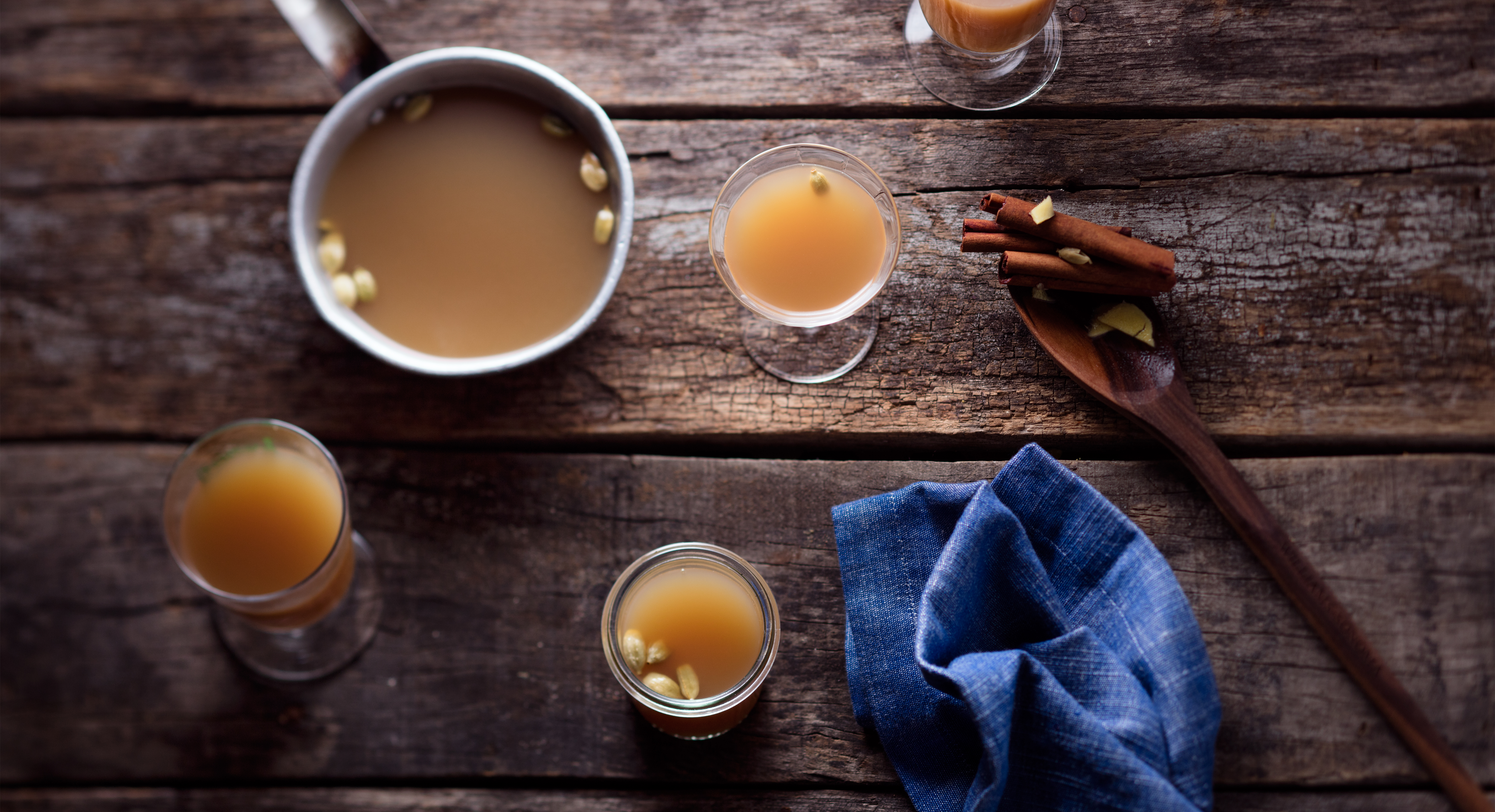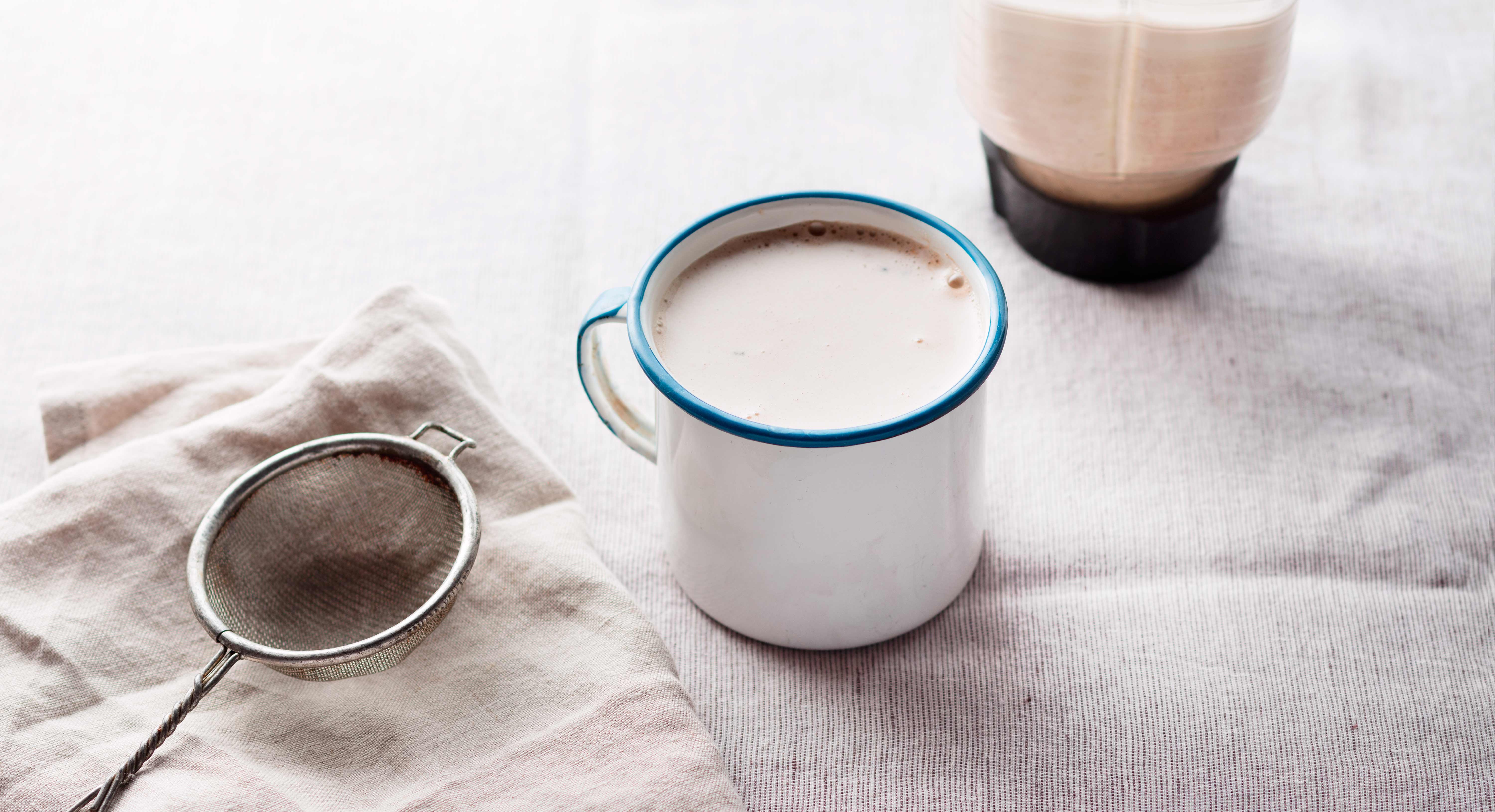Chai Tea Benefits
Publish Date: August 1, 2016
Last Update: January 26, 2026
Whether it’s a preferred way to start the day, a pick-me-up during the afternoon, or a calming beverage before bedtime, a cup of tea is good at any time. And the benefits of chai tea can’t be understated.
In fact, tea is the second most consumed beverage in the world (just behind water) and has long been revered for its antioxidant and anti-inflammatory properties, as well as the calming effects that come with its ritualistic preparation.
A plain cup of tea with no added sugar contains only a few calories, and caffeine-free varieties help keep the body hydrated. There are so many types—white tea, red tea, green tea, and black tea among the most common—each with their own characteristics and benefits. But few come close to the wholesome effects and benefits of chai tea.
The history of chai tea
Chai tea (also called masala chai) is a centuries-old beverage originating in India roughly 5,000 years ago as part of the alternative medicine practices known collectively as Ayurveda (which also includes massage, yoga, and healing herbs) [1]. In its earliest inception, it actually didn’t feature any tea leaves at all but was rather comprised of a variety of spices and created as a tonic to help cure certain ailments.
In the 1800s, as tea plantations were established in the country’s British colonies, black tea leaves eventually made their way into masala chai recipes, and chai tea became what we know it as today—a rich black tea with a mixture of spices. Though the brew from tea bags alone is popular, so are chai tea lattes, which are made when mixed with some kind of cream and sweetener.
In recent years, chai has become even more visible with trendy chai ices, chai milkshakes, and chocolate chai. While these ultra sweet variations are delicious, they actually aren’t that traditional, and in many cases the loads of extra sugar makes the drink lose its holistic traits. Instead, it’s the simple ingredients, including black tea (oxidized for longer periods of time for a bolder, stronger flavor) and spices such as cardamom, cinnamon, ginger, nutmeg, star anise, peppercorn, and cloves that make chai tea so good for you. These antioxidants are the real source of the benefits of chai tea.
The health benefits of drinking chai tea
The health benefits of chai tea truly lie within the spices. After all, the savory masala chai was first born as a tonic that could help with physical ailments and naturally heal the body.
Depending on the amounts of each spice used in your chai tea, the concoction could target different problems:
- Cardamom offers gastrointestinal protection as well as control over cholesterol and improved blood circulation [2] [3], both of which have also led to prevention of cardiovascular issues. It’s also been useful at clearing up urinary tract infections and enhancing mood [4].
- Cinnamon has been seen to help fight and prevent cancer [5], reduce the risk for Alzheimer’s disease and memory disorders [6], and also improve heart health.
- Cloves have been used since 300 B.C. for pain relief and as an antiseptic [7] [8], and can also be used in combination with other herbs to increase their potency.
- Peppercorn promotes circulation and better metabolism, which can mimic the role of the thyroid in providing better control over internal body temperatures [9].
- Nutmeg has a good concentration of manganese, which helps the body regulate blood sugar [10] and better metabolize carbs and calcium. In this regard, it’s also important for the health of bones and teeth [11].
- Star anise is the licorice tasting root native to China that is great at freshening breath and also provides a strong cough remedy [12].
- Ginger is another potent root that’s particularly good for digestive support [13]. It’s an effective way to rid nausea and stomach upset and also supports the immune system overall [14].
Antioxidant powers
In general, herbs and spices are considered potent antioxidants, which means that they help the body fight off dangerous free radicals. Free radicals are almost unpreventable as they’re a byproduct of environmental stressors that can cause oxidative stress to healthy cells and potentially lead to the development of certain diseases and cancers [15].
While the human body naturally creates antioxidants to help rid many of the free radical compounds, consuming antioxidant-rich foods can also improve health [16], particularly since many of them are part of a balanced diet of fruits, veggies, and whole grains that also offers extra vitamins, minerals, and fiber.
Reducing inflammation
Cinnamon, ginger, and cloves in particular can also help with chronic inflammation that, if left untreated, can lead to a whole host of extra health problems. While acute inflammation is a natural response by the body to help prevent infection, the immune system can un-needlessly stay in a high alert mode for a prolonged time leading to chronic inflammation that may cause symptoms such as:
- Itchy skin
- Acne
- Weight gain
- Digestive issues
- Joint pain
- Depression
And, over time, chronic inflammation can contribute to the development of heart disease, obesity, and cancer, as well as other issues [17]. Luckily, a balanced diet rich in nutrients can play a huge role in preventing these issues. By regularly consuming anti-inflammatory foods and spices, you can be well on your way to reducing the risk… another of the many chai tea benefits.
Other benefits of chai tea
So. is chai tea good for you? Aside from the delicious taste and all of the health power packed into spicy masala chai, there are a few other reasons to turn on the stove and brew a pot.
Post-dinner digestif
Almost any tea can work wonders for digestion. Chai tea has been used for millennia to help with stomach cramps, and is a great post-meal beverage to help the body break down food thanks to the metabolism-boosting peppercorn and soothing ginger.
A better source of caffeine
So, is chai tea caffeinated? The amount of caffeine you consume in one cup of chai will vary depending on how many tea leaves are used, but generally you’d need to drink about three cups of chai tea to get the same amount of caffeine as one cup of coffee. If you can’t get through the morning without coffee but hate the jitters it often provides, chai tea can be a more tolerable source of energy. By simply switching to chai tea instead of a morning cup of joe (or an afternoon soda), you’ll greatly reduce your intake and avoid the caffeine crash.
Another way to stay hydrated
Although the myth is that caffeinated drinks like black tea dehydrate the body, it’s not so. In actuality, the high volume of water in a cup of tea is actually quite hydrating to the body—and because chai tea has less caffeine than coffee [18], it’s the safer way to go. You’ll want to monitor how much sweetener you put in your drink, however. Using a sweetener like agave syrup that has a lower GI (glycemic index) instead of white sugar will ensure you aren’t consuming too much unnecessary sweet stuff [19].
How to brew a mug of chai tea
Like most other teas, making a hot cup of chai tea is relatively easy.
- Place one tea bag (or two for more potent flavor) in a mug, and pour eight ounces of boiling hot water inside.
- Cover and steep for five to ten minutes depending on how strong you want the brew to be.
- You can either stop here and drink the tea black; or, you can add a sweetener (try some organic sugar) and milk of your choice (condensed milk will make it thicker) to create your own chai latte.
- If you want it iced, follow all the same steps but use double the amount of tea bags and add the brew to a tall glass with ice cubes.
Other chai recipes
Besides just being a rich tea, chai flavoring can also enhance a number of other recipes, too. Here are some of Thrive Market’s favorite chai-inspired drinks and one tasty food idea to ensure you get all the benefits of chai tea while enjoying the taste!
Chai-Spiced Cider
Perfect for fall, or really any time of the year, this recipe stands up to pumpkin spice as the new “it” beverage. Start with two quarts of quality apple cider, then add in ginger, cinnamon sticks, cardamom pods, cloves, peppercorns, and vanilla beans. The combination will not only replicate the taste of chai, but also fill your home with all the same good smells.
Cashew Chai Milk Latte
In a pinch, you actually don’t need chai tea bags at all to make a chai latte. Start with scoops of healthful maca powder, add in soaked cashews, medjool dates, and of course cinnamon, cardamom, ginger, black pepper, and sea salt. Combine in a high-speed blender for a smooth texture, and then heat up. This drink is completely dairy-free and gluten-free.
Chai-Spiced Banana Crumb Muffins Recipe
Chai flavoring tastes great in breakfast food, too! This recipe combines the savory, spicy taste of chai with the sweetness of banana bread and the texture of crumb cake. To make it you’ll need all the usual spice suspects, plus brown sugar, coconut oil, sprouted white wheat flour, eggs, vanilla extract, and baking powder and soda.
Photo credit: Alicia Cho, Paul Delmont



